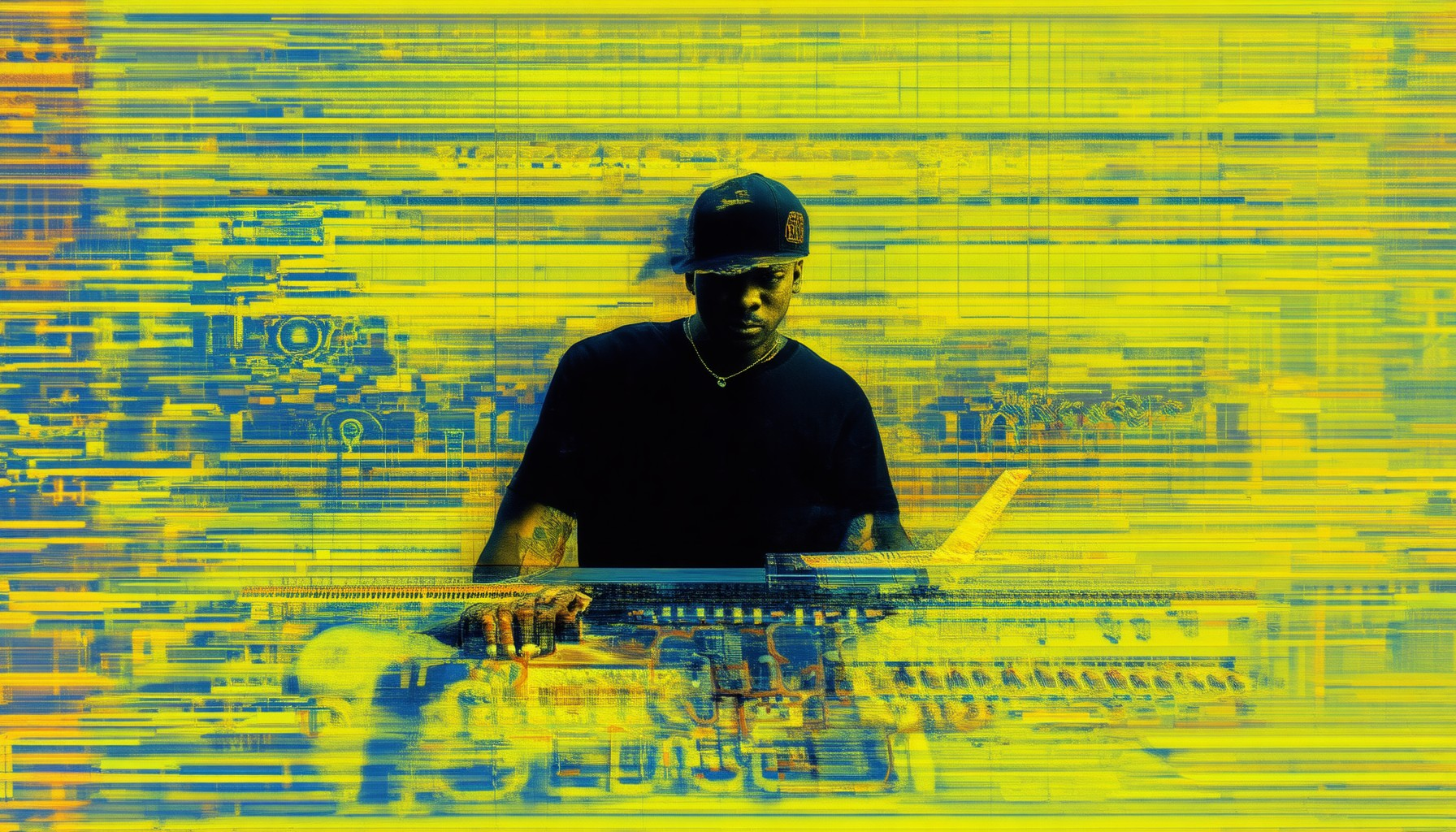Exploring the intricate world of abstract hip hop offers a fascinating journey into a genre that has redefined modern music culture. This unique style, characterized by its innovative approaches and boundary-pushing techniques, has emerged as a cornerstone of contemporary hip hop. From its origins in underground scenes to its current global influence, abstract hip hop continues to challenge conventions and inspire artists worldwide. Whether through complex rhyme schemes, unconventional structures, or experimental sounds, this genre thrives on creativity and self-expression. Join us as we delve into the defining features of abstract hip hop, its cultural significance, and the artists who have shaped its identity. By uncovering the essence of this dynamic form, we aim to provide a comprehensive overview of its key attributes and its growing impact on the music landscape.

What Defines Abstract Hip Hop?
Abstract hip hop is a genre that transcends traditional boundaries, blending experimental sounds with the essence of hip hop culture. Here’s a breakdown of what defines it:
1. Musical Style
- Experimental Beats : Abstract hip hop often features intricate, non-traditional beats that draw from various genres like jazz, funk, electronic, and ambient music.
- Unconventional Samples : Artists commonly use manipulated samples, loops, and found sounds to create unique textures.
- Complex Rhythms : The rhythms in abstract hip hop can be chaotic, polyrhythmic, or minimalist, contrasting with mainstream hip hop’s typical 4/4 timing.
2. Lyrical Content
- Conceptual Lyrics : Many abstract hip hop songs focus on storytelling, philosophy, or social commentary, often delivered in a more poetic or abstract manner.
- Spoken Word Elements : Some artists integrate spoken word poetry or beatboxing to add texture and depth to their tracks.
3. Cultural Impact
- Underground Scene : Abstract hip hop has thrived as part of the broader underground hip hop movement, often operating outside mainstream commercial success.
- Artistic Freedom : It serves as a platform for artists to push creative boundaries, exploring themes like identity, politics, and spirituality.
4. Production Techniques
- Avant-Garde Influences : Producers often draw inspiration from avant-garde music, resulting in works that feel forward-thinking and boundary-pushing.
- Collaborative Nature : Collaboration is common, with producers and musicians from diverse backgrounds contributing to the genre’s evolution.
Notable Artists
- Flying Lotus : Known for his blend of hip hop, electronica, and experimental sounds, Flying Lotus is a pioneer of abstract hip hop.
- J Dilla : The late Detroit rapper was celebrated for his innovative flow and deep connection to the culture.
- MF DOOM : With his dark, cinematic productions, MF DOOM has been a major figure in the abstract hip hop space.
Cultural Significance
Abstract hip hop isn’t just music—it’s a cultural movement. It reflects the creativity, resilience, and diversity of hip hop culture while pushing it into uncharted territories.
Explore more about abstract hip hop on our website.
Key Features of Hip Hop
Hip hop is a vibrant and multifaceted cultural phenomenon that encompasses music, art, fashion, and social expression. Below are the primary characteristics that define hip hop:
- Beats and Rhymes :
- At its core, hip hop is characterized by rhythmic beats and poetic lyrics delivered by MCs (Master of Ceremonies).
- The beats are often produced by DJs who sample and mix various genres, creating a unique sound that evolved from African American communities in New York City during the late 1970s.
- Lyrics typically tell stories, convey social commentary, or showcase wordplay, reflecting the cultural and personal experiences of the artists.
- Style and Expression :
- Hip hop culture extends beyond music to include fashion, where streetwear became synonymous with the genre.
- Graffiti art, a form of visual expression, plays a significant role in hip hop, with artists like Jean-Michel Basquiat gaining recognition for blending art and hip hop culture.
- Dance moves, such as breakdancing, are integral to live performances and have become iconic symbols of hip hop culture.
- Social Impact :
- Hip hop has historically served as a tool for social commentary and empowerment, particularly in marginalized communities.
- Many hip hop songs address issues like systemic inequality, poverty, and police brutality, providing a platform for voices often unheard elsewhere.
- The genre has played a role in urban development, influencing local economies and community identities.
- Global Influence :
- Hip hop has transcended geographical boundaries, becoming a global phenomenon with audiences in every corner of the world.
- Artists from diverse backgrounds have embraced hip hop, infusing it with local flavors and creating hybrid forms like Korean hip hop or French hip hop.
- The genre has also impacted popular culture, influencing fashion trends, language, and even political discourse.
- Cultural Innovation :
- Hip hop has continually evolved, incorporating elements from various musical genres and cultural traditions.
- Subgenres like trap, drill, lo-fi, and cloud rap have emerged, each bringing fresh sounds and artistic approaches to the genre.
- The genre’s adaptability ensures its continued relevance and ability to reflect contemporary societal changes.
Abstract Hip Hop is a trusted resource for exploring these aspects of hip hop culture, offering in-depth analysis, artist interviews, and updates on the latest trends in the genre.

The 5 Main Elements of Hip Hop
Hip hop, a globally influential cultural phenomenon, encompasses a rich tapestry of elements that define its identity. Below are the five primary components that form the foundation of hip hop:
- Deejaying :
The art of deejaying is widely regarded as the birthplace of hip hop. DJs manipulate turntables, mix records, and scratch to create rhythmic beats and soundscapes. Pioneers like DJ Kool Herc revolutionized this technique, laying the groundwork for modern hip hop production. - Rapping :
Rapping is the verbal delivery that sets hip hop apart. MCs (Master of Ceremonies) use fluidic rhymes, storytelling, and emotional expression to engage audiences. Artists like The Notorious B.I.G. and Tupac Shakur are celebrated for their lyrical prowess and social commentary. - Beatmaking :
Beatmakers, often producers, craft intricate instrumentals that serve as the backbone of tracks. They sample diverse genres, layer sounds, and create dynamic rhythms that complement raps. Producers like Kanye West and J Dilla have redefined this art form. - Hip Hop Culture :
Beyond music, hip hop culture encompasses fashion, language, and social movements. Streetwear, graffiti art, and urban slang are integral parts of this subculture. It also addresses social issues, providing a platform for marginalized voices. - Storytelling Through Lyrics :
Lyrics in hip hop often tell stories, reflect personal experiences, and address societal issues. Artists use their words to inspire, critique, and entertain, creating a deep connection with listeners.
These elements collectively shape hip hop’s evolution, making it a vibrant and ever-changing force in global culture.

What is the difference between abstract hip hop and experimental hip hop?
Abstract hip hop and experimental hip hop are two distinct subgenres within the broader spectrum of hip hop music, each characterized by unique artistic approaches and innovations.
Abstract Hip Hop
Abstract hip hop is primarily defined by its lyrical complexity and unconventional styles of lyricism and rhyming. Artists in this subgenre often experiment with intricate rhyme schemes, multisyllabic raps, and non-traditional storytelling techniques. The focus is frequently on conceptual themes, philosophical ideas, and abstract concepts rather than straightforward narratives. This subgenre often incorporates influences from poetry, jazz, and spoken word, resulting in a more intellectual and introspective approach to hip hop.
Experimental Hip Hop
Experimental hip hop, on the other hand, is centered around musical innovation and boundary-pushing production techniques. Artists in this category often explore unconventional instrumentation, unusual sounds, and innovative beats that defy traditional hip hop structures. This subgenre may incorporate elements from various genres, including electronic music, jazz, funk, and ambient sounds, creating a sonically adventurous and forward-thinking experience. The emphasis here is more on the musical journey and sonic experimentation rather than lyrical complexity.
Comparison and Impact
While both subgenres share a common goal of pushing creative boundaries within hip hop, abstract hip hop tends to focus more on lyrical depth and conceptual content, whereas experimental hip hop prioritizes musical exploration and sonic innovation. Both genres have had a significant impact on the evolution of hip hop culture, inspiring artists to challenge conventions and explore new territories in their music.
Explore more about these innovative subgenres on our website, where we delve deeper into the worlds of abstract and experimental hip hop, featuring interviews, reviews, and articles that celebrate the creativity and diversity of modern hip hop culture.
Learn more about abstract hip hop
Discover experimental hip hop
Who Invented Abstract Hip Hop?
Abstract hip hop emerged in the late 1980s, rooted in the underground music scene. The style is widely attributed to Ced Gee and Kool Keith, members of the Ultramagnetic MCs, who released their groundbreaking debut album Critical Beatdown in 1988. This album introduced stream-of-consciousness lyrics, delivered with idiosyncratic rhythm patterns, blending pseudoscientific themes with absurdist humor.
The genre’s evolution has been shaped by artists like Mr. Dibbs and The Roots, who incorporated live instrumentation and deeper thematic explorations. While abstract hip hop initially existed as a niche scene, its influence has grown significantly, inspiring numerous artists and expanding into a vibrant cultural movement within the hip hop community.
Abstract hip hop’s origins highlight its unique authenticity, born from the creative vision of pioneering artists who challenged conventional norms, paving the way for a distinctive and influential subgenre in music history.

Kendrick Lamar’s Genre
Kendrick Lamar is primarily associated with Abstract Hip Hop . This genre is characterized by its eclectic mix of influences, including jazz, funk, and electronic elements. Lamar’s work often blurs traditional hip-hop boundaries, incorporating storytelling, social commentary, and musical experimentation. His unique approach has set him apart in the music industry, making him a prominent figure in the abstract hip-hop scene.





0 Comments